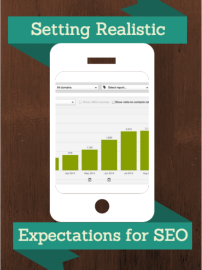So, you’ve done your due diligence when it comes to your website. You are on board with the Inbound Marketing philosophy, you recognize the value of your Internet presence and you totally get why high search engine rankings are valuable Internet real estate. You’ve committed to optimizing your website for search engines.
But what can you expect from an SEO campaign? It’s important to arm yourself with realistic expectations so that you have an understanding of the effect it will have on your business and your web presence. Many recognize the importance of search engine optimization but don’t realize just how much time and effort are required.
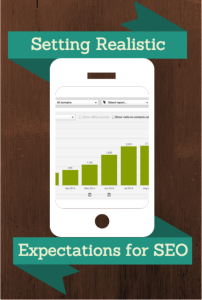
Below are some questions that arise when developing SEO campaigns, and the realistic answers to those questions.
SEO is just properly setting up my web pages, right? Au contraire, my dear. There is no such thing as cookie cutter SEO strategy, because different companies have different business models, industries, websites and marketing programs. What’s common among everyone is that SEO is not just something you “set and forget”. While it’s important to make sure all of your website pages are correctly set up with page titles, meta descriptions, optimized images and page structure, SEO is also an ongoing process. The setup portion is just the beginning.
It’s important to regularly monitor the traffic to your website to make sure that it is gradually improving over time, and to see how people are accessing your site. Your SEO strategy will change over time depending on these results. For example, if you notice that you gain most of your traffic from the keyword “gold chain pricing”, this tells you that people are interested in this topic. You can tailor your content strategy around it to further boost your traffic. You can create a “Buying Guide for Gold Jewelry”, and include pricing for gold chains on the page. This can help you convert leads and sales.
Additionally, it’s important to make sure that you are optimizing any new website pages that you make over time. And since you have a stellar content marketing strategy in place, you will definitely have new landing pages and blog entries to work on.
SEO isn’t just on-page either. Link building is an important SEO practice that takes time and gradual efforts. Linking to high-quality sites and acquiring links from other high-quality sites can take a bit of outreach, some impressive content creation and a lot of patience. This is not something you can build in a day.
For all of these reasons, SEO certainly is not a one-time-only type of deal. Consider then when planning your SEO investment. You will want the type of program that allows for ongoing activity, not just an up-front package.
How much effort do I need to put into SEO?
The amount of time and effort that needs to go into your search engine optimization campaign is related to the results that you want. If you want to just make sure that you’ve set up your pages properly and don’t plan on adding any more, that’s one thing. However, I don’t recommend that to anyone! You should be creating dynamic and interesting content routinely as part of your inbound marketing strategy. As you create new content, those pages should be optimized as well. Also, you will want to implement a link building strategy for that new content, to build your site’s credibility.
Additionally, if your industry is particularly competitive or saturated for your geographic location, it will take you a lot more time and effort to achieve the same results as someone else in a different industry.
First, assess where your website is at currently. Then, set your goals for website traffic. The space in the middle is what determines the amount of investment you will need in your SEO campaign.
How long will it take for me to see results?
This is a question that’s asked often, and unfortunately there is no straight answer for that. The average amount of time that it takes to see real results in a well-done SEO campaign is about 4-6 months. However, the true answer is: it depends. There are plenty of factors that play into how soon your results will show, including:
- Age of the website
- SEO past – have you had penalties in the past? How was the quality of your site before the campaign?
- Inbound Links to your website
One thing is for sure, you will not see results overnight. Most often, it will take a couple of months before your website makes traction on search engines. Sometimes it can take years for you to reach the spot you’d like to be on in search engine results.
For this reason, we never guarantee number one rankings or make claims of instant results on Google. SEO is a marathon, not a sprint. It takes time to build credibility, links and content on a website.
How do I track success or failure of my SEO efforts?
In order to track the progress of your SEO efforts, analytics are key. We love the HubSpot tools for analytics. They provide us with detailed information on how people are arriving on a website. HubSpot also offers inbound link tools, a really handy keyword bank with statistics and comprehensive website source charts.
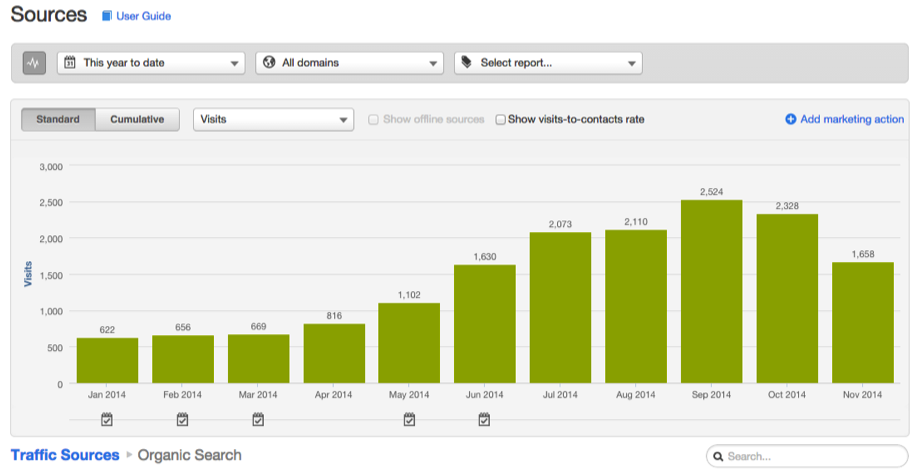
If you aren’t interested in HubSpot, or maybe it’s just not in your budget yet, Google Analytics should be your next stop. Google Analytics can tell you much of the same information so you can track your site’s traffic.
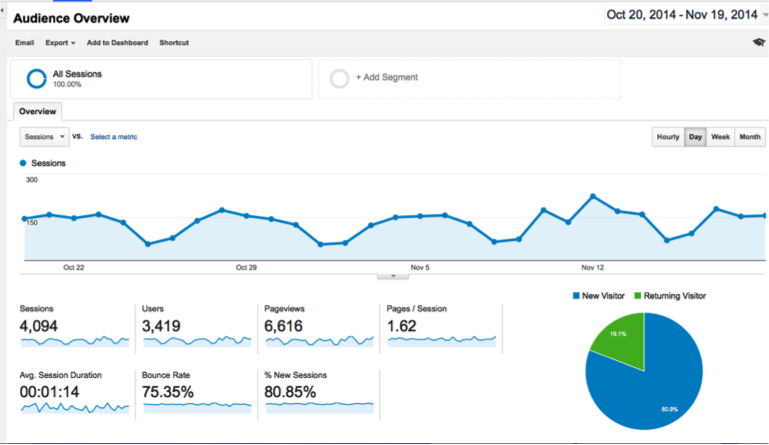
Additionally, set up Webmaster Tools through Google. This offers detailed reports about your website pages’ visibility on Google. If your traffic isn’t increasing the way that you want it too, Webmaster Tools can offer some more insight.
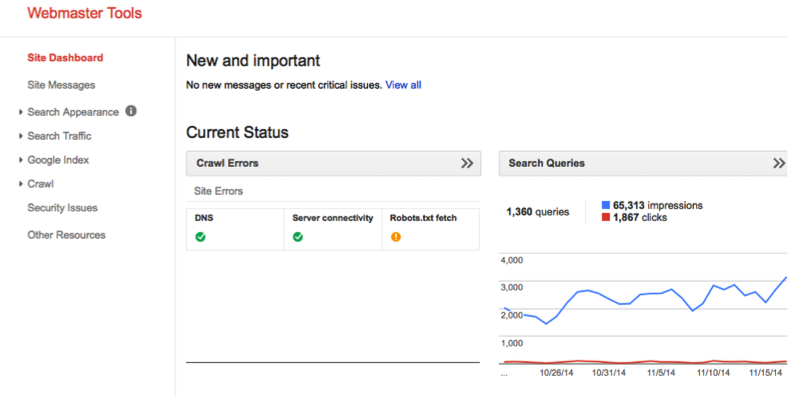
To determine the success or failure of your campaign, revisit the goals that were set before the campaign began. Have you reached your goals for website traffic? After the first few months of working on SEO, you should see gradual increases in your Organic Search traffic. If this doesn’t increase, you may need to invest more into SEO.
What happens if your search traffic gets worse? There are a few things that could be causing a drop in website traffic, so explore all of the options.
- Check Webmaster Tools to make sure no links are broken, that your site is being indexed and that no URLs are restricted by robots.txt.
- Also, check to see if there have been any major algorithm changes to the search engines themselves.
- Finally, think about your industry. Could there be a particular reason why your traffic has dropped off? For example, in the manufacturing industry, you may have seen less traffic in November compared to October because National Manufacturing Day was in October, which generated a lot of interest and buzz online.
There are several other ways to track the success of your SEO campaign. I found this Guide published by Moz to be especially helpful.
What other questions do you have about SEO? I’m happy to help! Leave a comment below and I’ll be sure to answer all of our SEO questions.
Digital & Social Articles on Business 2 Community
(364)
